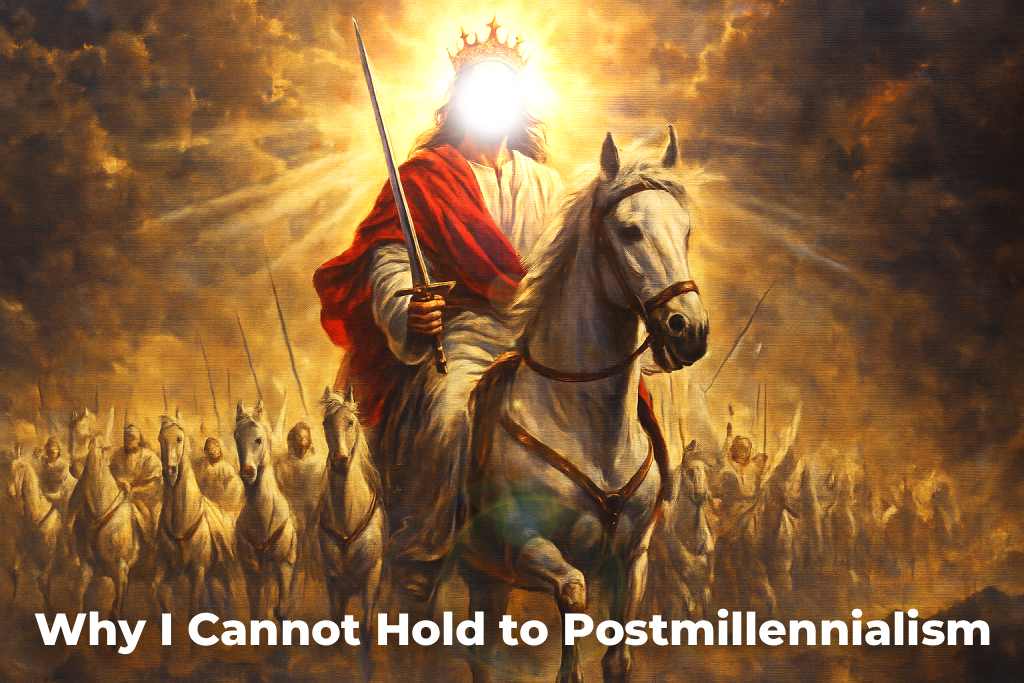
Today, I will cover why I cannot hold to Postmillennialism.
I personally adhere to the Historic Premillennial view of the end times. While I respect my brothers and sisters who hold to other millennial beliefs, I simply cannot affirm Postmillennialism as biblically accurate. I’m convinced that the Scriptures teach that Christ Himself will return before the millennium to establish His righteous reign on the earth, rather than the Church ushering it in beforehand.
That being said, I deeply love Amillennialists and Postmillennialists. We are all part of the same Body of Christ, united by the same Gospel, and I find rich fellowship and sharpening through conversations with believers who differ from me on these secondary issues. This is not about division, but discernment; and striving together to rightly handle the Word of Truth.
Before getting into my reasons for rejecting the Postmillennial position, it’s worth quickly summarizing the four major millennial views that Christians hold:
Historic Premillennialism
This view dates back to the early Church Fathers, such as Papias, Justin Martyr, and Irenaeus. It teaches that Jesus Christ will return before the millennium, which is a literal thousand-year reign on earth (Revelation 20). Historic premillennialists believe the Church will go through the Tribulation, and that believers will be resurrected and reign with Christ on earth during His millennial kingdom. It emphasizes one people of God, united in Christ, with no hard separation between Israel and the Church. The “Rapture” of the Church and the Second Coming of Christ are one and the same event.
This is the view I hold most strongly to, and in my estimation, I think there is a 90% likelihood of it being correct.
Dispensational Premillennialism
Dispensational Premillennialism arose in the 19th century through the teaching of John Nelson Darby, and it became widely popularized through the Scofield Reference Bible and modern prophecy movements. It also teaches that Christ will return before a literal thousand-year reign, but it differs from Historic Premillennialism by maintaining a sharp distinction between Israel and the Church. In this view, God’s prophetic program for Israel will resume after the Church is raptured, leading to a future seven-year tribulation period before Christ’s literal 1,000 millennial kingdom is established on earth. Dispensationalists believe that the “Rapture” of the Church and the Second Coming of Christ are two distinct events separated by seven years.
I personally reject this view.
Amillennialism
Amillennialists interpret the “thousand years” in Revelation 20 symbolically. They believe the millennium is now, representing the spiritual reign of Christ through His Church during the present age. The Second Coming and final judgment occur at the same time, followed by the new heavens and new earth.
In my opinion, this is possible but not probable, and I think there is a 10% likelihood of it being correct.
Postmillennialism
Postmillennialists also see the millennium as a symbolic period, but they believe it describes a future golden age on earth brought about through the spread of the Gospel. As more people and nations come under the influence of Christianity, the world will experience unprecedented peace and righteousness. Only after this age of gospel triumph will Christ return.
I personally reject this view completely (my reasons are directly below).
Why I Cannot Hold to Postmillennialism
Now that we have those viewpoints defined, let’s dig into why I think the Postmillennial view is incorrect.
1. The New Testament Describes the Last Days as a Time of Widespread Apostasy
While Postmillennialism anticipates a near-universal triumph of the gospel before Christ returns, the New Testament paints a very different picture of the world leading up to His coming.
Key texts:
- 2 Timothy 3:1-5 – “In the last days there will come times of difficulty… people will be lovers of self, lovers of money, proud, arrogant…”
- 2 Thessalonians 2:3-4 – speaks of “the rebellion” and “the man of lawlessness” before the Day of the Lord.
- Matthew 24:9-12 – Jesus warned that lawlessness will increase and “the love of many will grow cold.”
These passages suggest moral and spiritual decline, not improvement, before Christ’s return. Evil will intensify, not diminish. This directly contradicts the Postmillennial expectation of a golden age.
2. The Kingdom Advances Through Suffering, Not Societal Domination
If they persecuted Me, they will persecute you also”
– John 15:20
Through many tribulations we must enter the kingdom of God”
– Acts 14:22
Jesus told His followers to expect persecution, not cultural dominance. The pattern of redemptive history is not upward progress toward earthly victory, but repeated cycles of faithfulness amid suffering, culminating in Christ’s final return and judgment. The Church’s mission is to proclaim and endure, and not to politically or culturally conquer.
3. The “Millennium” Is Best Understood as Christ’s Future Reign on Earth
Premillennialists argue that Revelation 20 teaches a future thousand-year reign after Christ’s Second Coming. The sequence in Revelation is deliberate:
- Christ returns (Revelation 19)
- Satan is bound (Revelation 20:1-3)
- The saints reign with Christ (Revelation 20:4-6)
If Satan is already bound (as Postmillennialists claim), then his current influence in deception, persecution, and spiritual warfare contradicts Scripture’s description of his activity (2 Corinthians 4:4; 1 Peter 5:8). I know this is often disputed, but I believe that the order in Revelation is chronological, not symbolic, and points to a future reign of Christ on earth, not a present invisible one through the Church.
4. The Bible Promises Ultimate Restoration at Christ’s Coming, Not Before
Romans 8:19-23 teaches that creation itself will be set free from its bondage when believers are glorified – not gradually before that day. The full restoration of all things (Acts 3:21) happens after Christ returns, not through centuries of human reform.
While God’s kingdom is already present spiritually (Luke 17:21), its full physical manifestation awaits the return of the King. Until then, the world “lies in the power of the evil one” (1 John 5:19).
5. Postmillennialism Risks Shifting Focus from the Cross to Culture
In its more extreme forms, Postmillennialism (especially Theonomy and Christian Reconstructionism) can subtly encourage believers to view success in terms of earthly victory – political influence, societal reform, and national transformation – rather than the Gospel’s call to repentance and faith in the human heart.
My kingdom is not of this world”
– John 18:36
“We preach Christ crucified”
– 1 Corinthians 1:23
True transformation begins in the heart, not in the institutions of society. God is not redeeming earthly governments or systems; He is redeeming a people for Himself (Titus 2:14).
6. The Hope of the Church Is Christ’s Appearing, Not a Golden Age
“We wait for our blessed hope, the appearing of the glory of our great God and Savior Jesus Christ”
– Titus 2:13
Paul never urged believers to look forward to a coming golden era of global Christianity, but to the blessed hope of Christ’s appearing. That’s the posture of the New Testament Church – watching, waiting, and longing. The idea that humanity will usher in the kingdom before the King comes risks dulling that expectancy and replacing it with misplaced optimism in human progress.
I believe That Christ, and Not Culture, Brings the Kingdom
The more I study Scripture, the more I see that the hope of the Church is not in the gradual triumph of Christianity over culture, but in the sudden return of Christ to make all things new. The Bible’s trajectory isn’t toward a world slowly evolving into righteousness. It is toward a world under growing deception that will be rescued and restored when the true King appears.
Postmillennialism paints an inspiring picture of hope and victory, but in my opinion, it greatly misunderstands the timing. Christ’s kingdom will indeed fill the earth, but that will happen when He returns, not before. Until then, we are called to proclaim the Gospel faithfully, make disciples, endure hardship, and long for His coming.
Thoughts? Comments? Did I get Anything Wrong?
What do you think? Do you believe Scripture teaches that Christ will return before the millennium to establish His kingdom, or after the world has been transformed by the gospel? I’d love to hear your thoughts below.

0 Comments